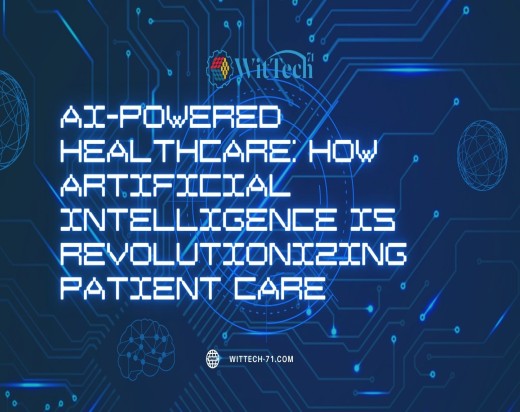AI-Powered Healthcare: How Artificial Intelligence is Revolutionizing Patient Care
In the fast-evolving landscape of healthcare, technology has emerged as a game-changer, and artificial intelligence (AI) stands at the forefront of this revolution. AI-powered healthcare solutions are transforming patient care, improving diagnosis and treatment, enhancing the patient experience, and streamlining healthcare operations. This article explores the remarkable impact of AI in healthcare and how it is reshaping the industry. We'll delve into various aspects of AI-powered healthcare and discuss its potential benefits and challenges.
The AI Revolution in Healthcare
Artificial intelligence has taken healthcare to new heights, offering advanced tools and solutions that were once considered science fiction. From early disease detection to personalized treatment plans, AI is making a significant impact in multiple healthcare domains:
1. Early Disease Detection
One of the most crucial areas where AI is revolutionizing healthcare is early disease detection. AI algorithms can analyze medical images, such as X-rays, MRIs, and CT scans, with remarkable precision. By detecting anomalies and patterns that may elude human eyes, AI can identify diseases like cancer, cardiovascular issues, and neurological disorders at their earliest stages. This early detection leads to more effective treatment and, in many cases, increased chances of survival.
2. Personalized Treatment Plans
AI analyzes a vast amount of patient data to create personalized treatment plans. These plans consider a patient's genetics, medical history, lifestyle, and real-time health data to tailor treatment regimens. With personalized medicine, doctors can prescribe medications and therapies that are more likely to work for a specific individual, reducing adverse effects and increasing the chances of a successful outcome.
3. Drug Discovery
The pharmaceutical industry is benefiting from AI in drug discovery. AI algorithms can sift through extensive datasets to identify potential drug candidates for a wide range of diseases. This significantly accelerates the drug development process, reduces costs, and increases the chances of finding new treatments and cures.
4. Remote Monitoring
AI-enabled devices and wearables are allowing patients to monitor their health remotely. From smartwatches that track heart rate to glucose monitoring systems for diabetics, these technologies provide real-time data to healthcare providers, enabling early intervention and reducing the need for in-person visits. This is especially crucial in the context of the COVID-19 pandemic, where remote monitoring has become the norm.
5. Predictive Analytics
Hospitals and healthcare systems are utilizing predictive analytics powered by AI to forecast patient trends and allocate resources efficiently. AI can predict patient admission rates, identify potential disease outbreaks, and optimize staffing and resource allocation, ensuring that healthcare facilities operate at their best capacity.
Benefits of AI-Powered Healthcare
The adoption of AI in healthcare comes with a host of benefits, which include:
1. Improved Accuracy
AI systems are incredibly accurate in analyzing medical data and images. Their precision reduces the risk of misdiagnosis and ensures that patients receive the right treatment at the right time.
2. Enhanced Efficiency
AI-powered tools streamline healthcare processes, from appointment scheduling to data entry. This increases the efficiency of healthcare providers, allowing them to focus more on patient care and less on administrative tasks.
3. Cost Reduction
By automating various tasks and optimizing resource allocation, AI can significantly reduce healthcare costs. This is particularly important in a time when healthcare expenditure is a global concern.
4. Better Patient Experience
AI improves the overall patient experience by offering more personalized care, reducing waiting times, and ensuring that patients are well-informed about their conditions and treatment plans.
5. Increased Accessibility
Telehealth and remote monitoring powered by AI make healthcare more accessible to people in remote or underserved areas. Patients can receive care without the need for a physical visit to a healthcare facility.
Challenges and Concerns
While the potential benefits of AI in healthcare are undeniable, there are also challenges and concerns to consider:
1. Data Privacy and Security
The use of AI in healthcare requires the collection and storage of massive amounts of patient data. Ensuring the security and privacy of this data is a significant challenge. Healthcare providers must implement robust cybersecurity measures to protect sensitive patient information.
2. Liability and Accountability
In cases where AI is involved in medical decisions, questions of liability and accountability arise. If an AI system makes an incorrect diagnosis or treatment recommendation, who is responsible?
3. Ethical Considerations
AI algorithms can inadvertently perpetuate biases in healthcare. For example, if training data is biased, the AI system may make decisions that favor one group over another. Ethical considerations are essential to avoid discrimination in healthcare.
4. Regulatory Hurdles
Regulatory bodies worldwide are struggling to keep up with the rapid advancements in AI in healthcare. The lack of clear regulations can hinder the adoption of AI technologies.
The Future of AI in Healthcare
As AI continues to evolve, its role in healthcare is expected to expand further. Here are some trends that we can anticipate in the coming years:
1. AI-Enhanced Medical Education
AI will be integrated into medical education, providing students and healthcare professionals with advanced tools for learning and decision-making.
2. Increased Telehealth Adoption
The convenience and accessibility of telehealth services will lead to continued growth in this sector, driven by AI-enabled remote monitoring and consultation.
3. AI-Powered Drug Development
Pharmaceutical companies will rely more on AI to speed up drug discovery, reducing the time and costs involved in bringing new medications to market.
4. Personalized Healthcare
The concept of personalized medicine will become the standard, with AI playing a central role in customizing treatment plans for each patient.
5. Collaborative AI
Healthcare providers and AI systems will work together in a more collaborative manner, with AI serving as a valuable tool to assist healthcare professionals in their decision-making processes.
Conclusion
The integration of artificial intelligence into healthcare is revolutionizing patient care in profound ways. From early disease detection to personalized treatment plans and drug discovery, AI offers numerous benefits that have the potential to transform healthcare for the better. However, challenges related to data privacy, liability, ethics, and regulations must be addressed to fully realize AI's potential.
As we move forward, it is crucial for healthcare professionals, policymakers, and technology experts to work together to harness the power of AI while ensuring that patient safety and data security remain top priorities. The future of AI-powered healthcare is promising, and with responsible implementation, it has the potential to improve the lives of millions of patients worldwide.





Comments